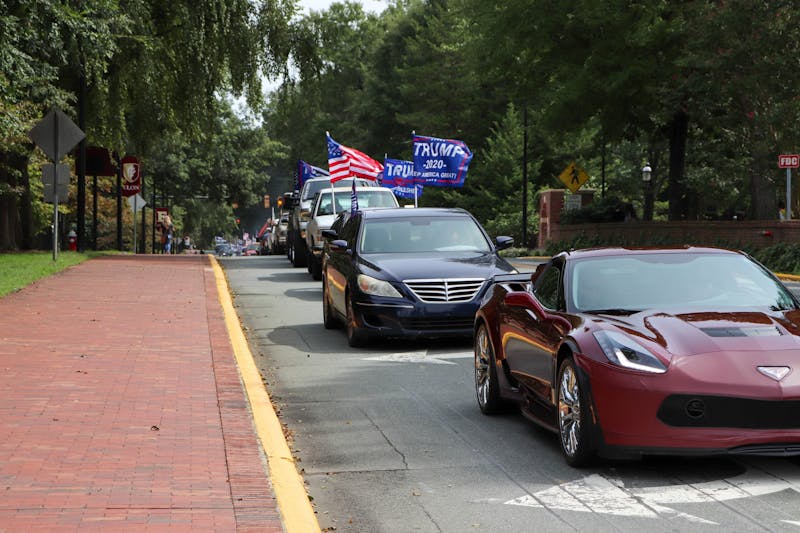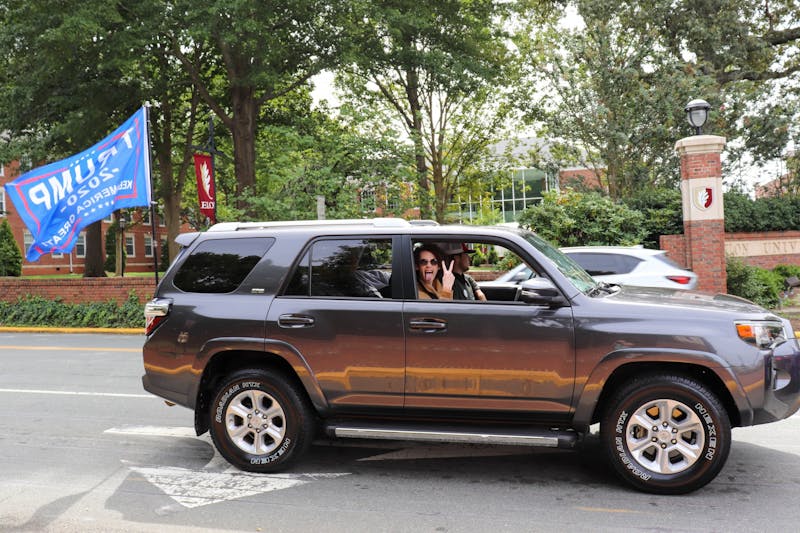Six no-trespass orders have been issued by campus police to individuals who yelled at students and faculty during a recent parade through Elon University’s campus supporting President Donald Trump’s reelection bid, according to Vice President of University Communications Dan Anderson. The orders are certified documents from interim Director of Campus Police Doug Dotson, delivered to the individuals after a request by President Connie Book following the convoy's ride through campus.
The university will not release copies of the letters served to each of the six individuals, nor will they release a sample letter, according to Anderson.
Elon News Network could not obtain these documents as they are not publicly available, according to the Campus Police Act in North Carolina. As a private institution, branches of Elon University such as Campus Safety and Police are not subject to the Freedom of Information Act like government agencies such as public universities are.
Dotson did not respond to Elon News Network's multiple requests for comment, but relayed some information via Anderson.
In a statement to Elon News Network, Anderson wrote that the orders are "administrative actions" by Dotson on behalf of the university and are "not the equivalent of police orders." In a later interview, Anderson clarified that the orders serve as documentation that would allow campus police to charge the specified individuals with criminal misdemeanor charges of trespassing if they are detained on campus property in the future.
Anderson clarified that the letters notify the individuals that they are "ordered to not be physically present on Elon property" and that they are subject to charges for trespassing if they violate the order.
In emails obtained by Elon News Network from the town of Elon Police, on Sept. 23 Dotson wrote to town Chief of Police Kelly Blackwelder that he’s concerned that the no-trespass orders will cause more activity in Elon.
“I have been directed to issue two trespass warnings thus far and anticipate a request for more regarding the convoy on Saturday,” he wrote. “I have concerns that this will ramp up activity in Elon and I have expressed that to administration.”
In another email obtained from the town of Elon Police, Vice President for Student Life Jon Dooley asked Dotson on Sept. 14 ahead of the convoy what could be done about the convoy if it went through Elon because the caravan may “raise concern among our students” if there was shouting out of windows or the content on the flags.
Dotson responded on Sept. 15 that if the route of the caravan was known — which it wasn’t — in coordination with town police, Elon University police would block traffic to “get this convoy through Elon as quickly as possible.”
In North Carolina, if an individual enters a premises after being told not to, it is considered second degree trespassing, which is a class three misdemeanor. This is punishable by a fine or imprisonment, depending on the number of prior offenses.
Elon's no-trespass orders cannot prevent the six individuals from driving on the public streets that run through campus, nor do the orders prevent the individuals from yelling out of their vehicles as they did on Sept. 19, Anderson said.
At the latest Board of Aldermen meeting, the board did not approve the university's proposal to close East Haggard Avenue. The original proposal did not cite the convoy as a reason to close down the road, but in a public comment at the meeting she cited the caravan as an additional reason why the road should be closed.
"What they did was not a crime," Anderson said, adding that campus police can arrest individuals only when they commit a crime, such as swerving a vehicle in a threatening way.
During a recent fireside chat, Book addressed the no-trespass orders issued against participants in the convoy. In addition to the no-trespass orders issued to the six individuals, Book said the university was able to ticket drivers who returned to campus after the convoy for being "disruptive" from their cars.
In North Carolina, disorderly conduct is a class two misdemeanor. This includes disturbing the peace at public or private universities, according to the North Carolina General Assembly.
Book said the "only recourse" she has is to issue tickets and no-trespass orders against these individuals, since the First Amendment protects individuals in their cars.
The no-trespass orders against the six individuals identified from the convoy are in effect indefinitely, Anderson wrote.
—
Aaron Simansky contributed to the reporting of this story.



